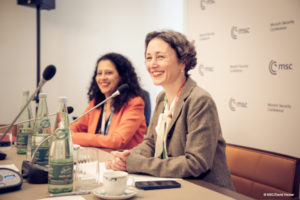Russia’s war of aggression against Ukraine and the ongoing war between Israel and Hamas show that the instrument of military conflict is once again being used as such, seen as a legitimate instrument by an increasing number of those in power.

20240216 MSC, Munich Security Conference, Bayrischer Hof – Salon II: Participants engage in discussion at the MSC 2024, with microphones, bottled water, and conference paraphernalia on the table. Photo: David Hecker/MSC
The two wars have far-reaching implications for German and international politics. While Federal Chancellor Olaf Scholz proclaimed a ‘Zeitenwende’ in 2022 and Germany adopted a National Security Strategy for the first time in 2023, Finland and Sweden decided to join NATO.
Against this backdrop, the 60th Munich Security Conference (MSC), which took place from 16 to 18 February under the motto „Lose – Lose?“, dealt with the effects of increasing geopolitical competition and economic uncertainty on international cooperation. In light of the observed downward trend in world politics, the conference emphasised the importance of global cooperation formats in order to jointly tackle current global challenges. Prof. Anna-Katharina Hornidge, who represented IDOS at the MSC, and Dr Julia Leininger reflected on the discussions at the MSC in a Current Column. In their analysis of the interaction between security and development policy, the authors emphasise that security policy is not development policy; development policy, on the other hand, which stands for reciprocal and constructive cooperation in order to develop and implement common visions for the future, is designed to be long-term and structure-building, thus contributing to ensuring sustainable peace.
A concrete example of this is the role of development policy in the area of food security. Anna-Katharina Hornidge moderated an MSC side event on 16 February on the topic of „Artificial Intelligence in Geopolitical Food Security Dynamics“. In an exchange with the panellists, Vieshnavi Rattehalli, US Department of State, Helga Flores Trejo, Bayer AG, and Albertine van Wolfswinkel, Cargill, she reflected on the role of scientific and political cooperation in ensuring food security despite changing climatic conditions.
While the MSC focussed in particular on global challenges and the observed „downward trend in world politics“, this year’s Raisina Dialogue, which took place from 21-23 February in New Delhi, also reflected on the possibilities of political reorganisation. Under the motto „Chaturanga, Conflict, Contest, Cooperate, Create“, high-ranking international representatives from politics, the private sector, academia and civil society discussed challenges and opportunities for cooperation in a multipolar world order. One important topic was the shaping of a fairer and more inclusive international society, in which the voices of low- and middle-income countries are better heard. On 21 February, Anna-Katharina Hornidge took part in a panel discussion on „South Rising: Institutionalising a South First Approach at G20“, moderated by Candith Mashego-Dlamini, Deputy Minister for International Relations and Cooperation, South Africa. Together with the other speakers, Muktesh Kumar Pardeshi, Ministry of External Affairs (India), Saïd Abass Ahamed, African Union, Dino Patti Djalal, Foreign Policy Community of Indonesia (Indonesia), and Fabio Soares, Institute for Applied Economic Research (Brazil), she reflected on new opportunities for action arising from the four successive „South Presidencies“ of the G20. In particular, Anna-Katharina Hornidge underlined the important role of the African Union, as the newest member of the G20, in representing the interests and perspectives of African states and in close coordination with South Africa, a member of the G20, at the G20 table.
